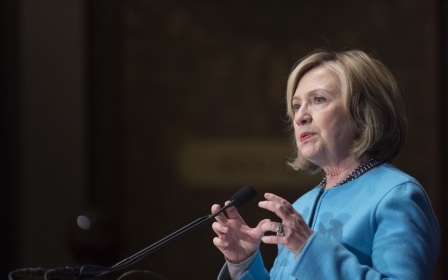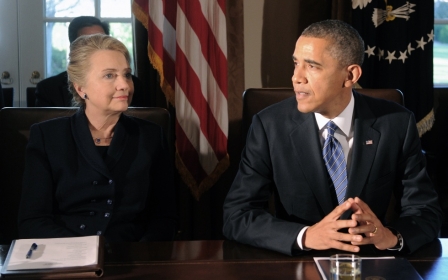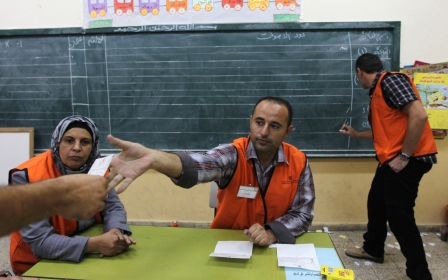ANALYSIS: Hillary Clinton a 'wolf in wolf's clothing' for Mideast?

NEW YORK - Newly-announced presidential candidate Hillary Clinton boarded her bus and headed west on Monday for a campaign aimed at helping “everyday Americans” that has hitherto made no explicit mention of US foreign policy in the restless Middle East.
The challenges of the Middle East are not a vote-winner in the US Midwest, where residents care more about jobs and pay cheques. Nevertheless, Clinton’s campaign raises questions about her views on an oil-rich region that has been central to US foreign policy for decades.
Clinton famously voted in 2002 to support the Iraq war; in 2011, she argued for NATO missile strikes against Libyan leader Muammar Gaddafi. She also speaks favourably of her good relationship with Israeli Prime Minister Benjamin Netanyahu.
After Clinton announced her much-anticipated White House run on Sunday, German Foreign Minister Frank-Walter Steinmeier praised her as a friend of Europeans with “sure instincts in world crises – from Afghanistan to the Middle East”.
The 67-year-old also has critics. Jennifer Loewenstein, a scholar at the University of Wisconsin-Madison told Middle East Eye she is a “wolf in wolf's clothing” with interventionist reflexes and little regard for Palestinian suffering.
“She’s trying hard to look like a hawk, even though she’s a Democrat,” Loewenstein said. “She wants to appear pro-Israel and tough on Iran and has no intention of doing anything that could be spun by her adversaries as weak or ‘feminine’.”
Others highlight Arab donations to the Clinton Foundation, a charity she set up with her husband Bill Clinton at the end of his presidency. Her handling of a September 2012 attack on a US diplomatic compound in Benghazi, Libya, is also back in the spotlight.
To mark her formal entrance into the 2016 race for the White House, MEE takes a look at Clinton’s Middle East scorecard as first lady, Democratic senator for the state of New York, during her failed 2008 presidential bid and as US Secretary of State.
Backpeddling on the 2003 Iraq invasion
In 2002, Clinton backed President George W Bush’s 2002 resolution authorising use of force in Iraq. Once it become clear that the premise for war, Iraq’s alleged weapons of mass destruction (WMD), was bogus, she recanted, saying she had “learned to be far more sceptical of what I’m told by presidents”.
According to Joshua Landis, a regional expert from Oklahoma University, “She didn’t learn any lessons from Iraq.” Clinton’s interventionist tendencies and preference for old-fashioned Arab autocrats in Saudi Arabia and elsewhere would make her a “status quo” commander-in-chief.
“Even though she says she regretted it, she’s gone off and made the exact same miscalculations a second time,” Landis told MEE.
Libya and Benghazi
After Gaddafi appeared on television and threatened to cleanse Libya of anti-government protestors “house by house”, Clinton became a driving force behind the NATO-led bombing campaign in support of rebels that helped topple the regime in 2011.
This may not have been the life-saving humanitarian intervention that Clinton called it at the time, according to recent investigations by The Washington Times.
The newspaper spoke with defence officials who said there had been “no specific evidence of an impending genocide in Libya” and accused Clinton of using “speculative arguments” to push for an unnecessary air campaign that sent the country spinning into chaos.
It was Clinton’s “WMD moment”, the daily claimed.
On Sunday, Republican presidential candidate Senator Rand Paul cast doubt on Clinton’s suitability for the White House over her handling of the 2012 attack on the US mission in Benghazi, Libya, in which a US ambassador and three other US nationals were killed.
Clinton has defended her decision to post diplomats in hotspots and noted some problems in Benghazi – but hard-line Republicans remain unconvinced and say she is too weak for the White House. “Would she be there for the 3am phone call?” asked Paul.
Syria, Iraq and the black-hooded threat
Clinton famously disagreed with her boss, US President Barack Obama, in the early stages of the Syrian uprising. Obama, a non-interventionist who was elected on a platform of disentangling America from costly wars in Afghanistan and Iraq, was wary of backing rebels against Syrian President Bashar al-Assad.
Obama often said: “Don’t do stupid stuff” to describe his policy shift from the Bush era.
Speaking with The Atlantic last year, Clinton drew a line between herself and Obama, saying: “Great nations need organising principles, and ‘Don’t do stupid stuff’ is not an organising principle.” Failing to back Syria’s initial protestors “left a big vacuum, which the jihadists have now filled,” she added.
Clinton may have been borne out over intervening earlier in Syria: the rise of Islamic State (IS) militants in 2014 led Obama to authorise US-led airstrikes in Iraq and Syria and a late-stage bid to arm and train moderate Syrian fighters.
Clinton has since re-aligned with Obama and argued against deploying US soldiers to fight the Sunni Muslim extremists. US-led air strikes and forces from Iraq should lead what will inevitably be a “long-term struggle”, she said.
“Hillary wanted to build a third way in Syria; but would America really pour resources into destroying the Islamists and Assadists and get involved in state-building?” asked Landis. “That’s perilous because the opposition is fragmented and the US could be sucked in, spending money and creating refugees.”
Nuclear dealing with Iran
Clinton has been involved in the sanctions against Iran and negotiations over its controversial nuclear programme, which the West says could yield nuclear bombs but Tehran insists is for peaceful purposes. Her tone has shifted from hawkish to conciliatory.
In 2008, Clinton said the US could “totally obliterate” Iran in retaliation for a nuclear strike against Israel. In 2014, she said the deal being negotiated by the US and other world powers should leave Iran with “so little enrichment or no enrichment” capacity for uranium. She now speaks favourably of a recently struck framework deal that leaves Iran with substantial enrichment capacity. “Diplomacy deserves a chance to succeed,” she said.
Israel, Palestine and the seldom-seen peace process
Obama’s relations with Israeli leader Netanyahu have descended into bitter acrimony, but Clinton is widely seen as warmer to Israel's hard-line leader. “I've known Bibi a long time,” she told CNN in 2014. “And I have a very good relationship with him, in part because we can yell at each other, and we do.”
In July 2014, when Israeli shells hit a UN school in a refugee camp in Gaza, killing more than 15 people, mostly women and children, Clinton was criticised as an apologist for Israeli aggression. She said the “fog of war” made it hard to determine if Israel was at fault.
According to Loewenstein, a Clinton presidency would be bad news for Palestinians. “She will continue to support atrocities by saying nothing, doing nothing and using the same worn-out lies about negotiations, peace processes and two-state solutions. I would not be surprised if she has a much better relationship with Netanyahu than Obama does,” she told MEE.
Mideast cash for a charity splash
Earlier this month, news website Politico reported that a Moroccan government phosphate firm has pledged some $1 million to the Clinton Foundation – prompting a review of Clinton’s shift to making favourable statements about Morocco despite its human rights issues.
The Clintons are no strangers to financial scandals. Their foundation stopped accepting money from foreign governments in 2009, when Clinton became secretary of state. After she resigned in 2013, the foundation has taken cash from Saudi Arabia, the United Arab Emirates and Oman.
Republican-libertarian Paul has attacked Clinton over foreign money flowing to the family fund. “It’s going to be hard for her to say she’s for women’s rights when she’s accepting money from sort of stone-age sort of regimes that really abuse the rights of women,” he told CBS.
Clinton's campaign team did not respond to MEE's interview request.
Stay informed with MEE's newsletters
Sign up to get the latest alerts, insights and analysis, starting with Turkey Unpacked
Middle East Eye delivers independent and unrivalled coverage and analysis of the Middle East, North Africa and beyond. To learn more about republishing this content and the associated fees, please fill out this form. More about MEE can be found here.




